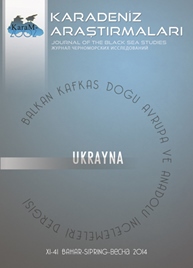UKRAYNA KRİZİNİN ULUSAL, BÖLGESEL-KÜRESEL BAĞLAMI VE GELECEK ÖNGÖRÜLERİ
National and Regional-Global Context of the Crisis in Ukraıne and Perspectives for Future
Author(s): Oktay BingölSubject(s): Politics / Political Sciences
Published by: Karadeniz Araştırmaları Merkezi
Keywords: Ukraine crisis; Near abroad; Energy; Russia; USA
Summary/Abstract: In this article, Ukraine’s crisis, which started from the end of 2013 and has matured in February 2014, and has begun to occupy the world agenda is seen as a comprehensive and multi dimensional conflict with historical, socio- cultural, economic, psychological, institutional, geopolitical and international dimensions beyond the triggers and catalysts Ukrainian state can not provide legitimacy in the whole country in more than 20 years after the USSR. In Ukraine, the demographic differentiation of the country corresponding to the struggle for influence between the EU and Russia, and the geopolitical lines rather than ethnic and religious ones is seen as a major obstacle in building the national identity and modern Ukrainian nation. In the current crisis, the dependence of Ukrainian economy on Russia and control of it by the alliance of oligarchs and political elites are another important factor. Russia's efforts in recent years to use the population with close ties to her and the energy resources as the means of foreign policy against the national movements in the near abroad give rise to destructive effect with Ukraine in particular. As NATO and EU enlargement get closer to her borders, Russia has seen the threat it has perceived as vital for survival, and is moving with zero-sum game approach in Ukraine similar to Georgia crisis. It is seen likely that Ukraine crisis could spread outside of Eastern Europe in the coming period. In this context, the interactions between the struggle for power, particularly energy in Eurasia, and the Cyprus problem, the Middle East Peace Process, Iran's nuclear program, the Syrian crisis and the Kurdish problem are seen highly possible. It is assessed that the new conflict areas and cooperation opportunities at the global level may arise during this period in which the United States has turned to East Asia and the Pacific.
Journal: Karadeniz Araştırmaları
- Issue Year: 2014
- Issue No: 41
- Page Range: 15-38
- Page Count: 24
- Language: Turkish

